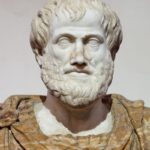For Socrates music is very important, but not for pleasure, rather a utility to educate. In this article we cover his life and his thoughts on music.
Who was Socrates?
Socrates was a Greek philosopher from Athens, regarded as the founder of Western-philosophy, and among the firsts in moral philosophy.
Socrates was born next to Athens, in Alopece, in 470 or 469 BC. His education followed the customs of contemporary Athens, basic skills in reading and writing, gymnastics, music and poetry.
Socrates, although inherited wealth from his parents, he lived a simple life. He walked barefoot, owned only one coat and rarely bathed. In his eating and sexual life was moderate. He married twice and had three sons.
He was very popular among the youth of Athens, despite the fact that he was considered ugly. He had a flat, turned-up nose and large belly. In ancient Greece wisdom was always connected to physical beauty as well, and having a popular philosopher who was not beautiful, was a curiosity.
Although he did not take part in political rivalries, he had enemies. In 399 BC he was accused of impiety (asebeia in Greek) and corrupting the minds of the youth. Looking back, the religion-based accusations look rather silly. His transgressions were, having the conviction that gods do not sin (like humans), and that each person has daimonion, a divine inner voice. As for the corruption of the youth, he defended himself on logical grounds by saying that he did not do so, as one corrupting others means he himself gets corrupted, and that is not a logical thing to do.
His trial took only one day and the majority of the jury cast the vote of guilty. As customary, he was offered to propose his own penalty. With some sense of humor he proposed that he should get free food and housing from the state or as an alternative one mina of silver as a fine (according to him that was all his wealth). The proposal was rejected and he was sentenced to death by drinking poisonous hemlock. He died in 399 BC.
Since Socrates did not document his ideas and teachings, we are facing a problem called Socratic Problem. In a nutshell it means that all we know about this philosopher comes from other sources, mainly Plato and Xenophon, both his pupils. These accounts are in the form of dialogues, that later created a new literary genre.
What did Socrates say about music?
Keeping in mind the above mentioned Socratic Problem, let us focus now on what this philosopher thought on music!
For Socrates music is part of education, merely an instrument to civilize the soul, and this process must start in youth.
In Plato’s Republic Socrates talks about education in detail. First, he divides it into two parts: the education of the warrior guardians and of the philosopher-kings.
In the guardians part, the warriors are defending the city, but they have the natural tendency to tyranny and this must be controlled. The way to control them is purposeful education, making them fierce against enemies and gentle with the known, the familiar. He seeks this balance in the education of gymnastics for the body, and music for the soul. As a result, guardians will be like “noble puppies”, strong in defending beliefs and weak in critical thinking.
Later, when talking about the philosopher-kings, he admits that the first version of education is not ultimate, rather incomplete. All should be a philosopher-king! He admits that education will not make men a certain way, but rather helps to identify those who are capable of greater good, of philosophizing. This way he introduces the idea of the “greatest study”, which is the study of “the good”. This must be the cornerstone of the education for philosopher kings.
In Socrates’ view musical education must start with tales (in ancient Greece music means activities under the care of the Muses, like poetry and melodic music). Mothers and nurses should tell well selected (censored) tales to shape the young souls towards the good. The definition of good reflects the contemporary ideas and morals. One good example is the part, where Socrates explains that through these stories children should grow up fearing slavery more than death. He also discusses the form of narrative styles (simple vs. imitative).
In the question of musical education, Socrates follows the same path as with the tales. Musical melodies should be moderate, austere, only using simple instruments like cither, pipe or lyre. He emphasizes the importance of the correct order, or dominance, in relation of speech and music. Music must follow and accompany the speech, not the other way around. “Good speech, good harmony, good grace, and good rhythm accompany good disposition” – says Socrates.
Music and gymnastics, and their balance is important. Socrates argues that too much physical exercise will make people savage and too much music, soft. Soft people are not useful on battlefields, warriors for thinking. He says, “The man who makes the finest mixture of gymnastic with music and brings them to his soul in the most proper measure is the one of whom we would most correctly say that he is the most perfectly musical and well harmonized.”









